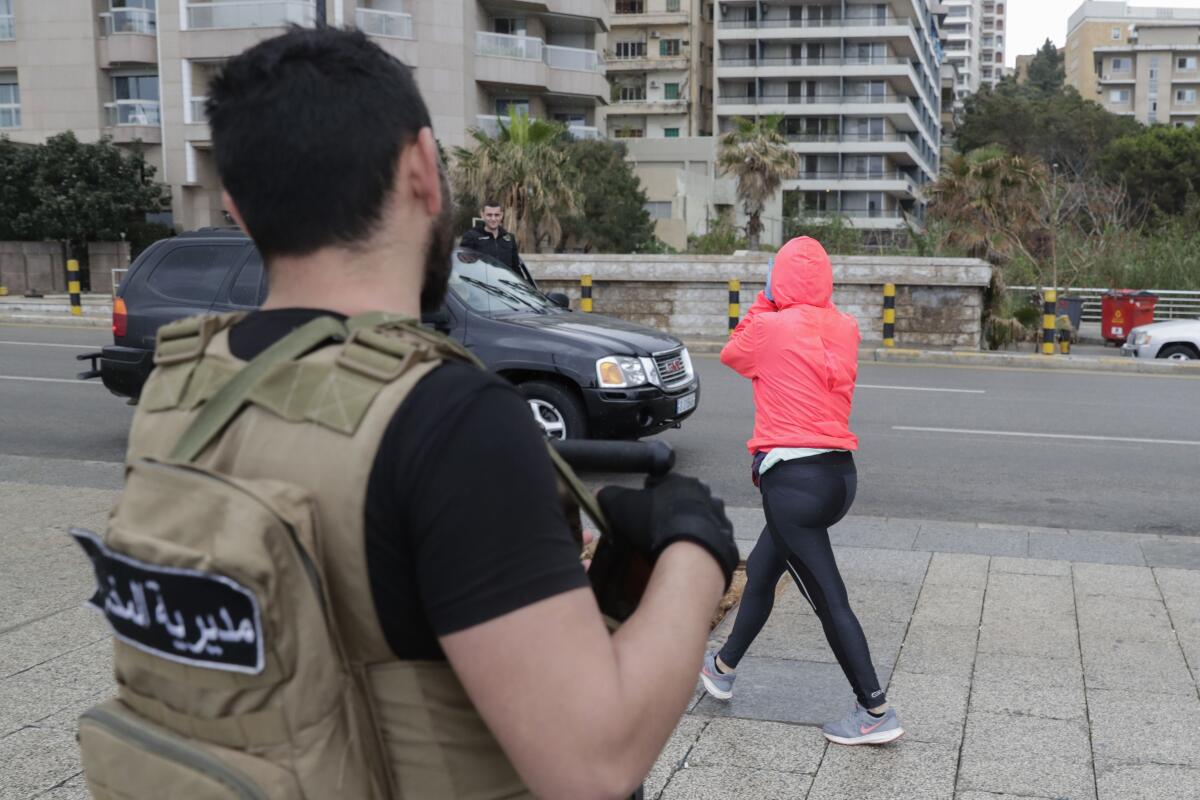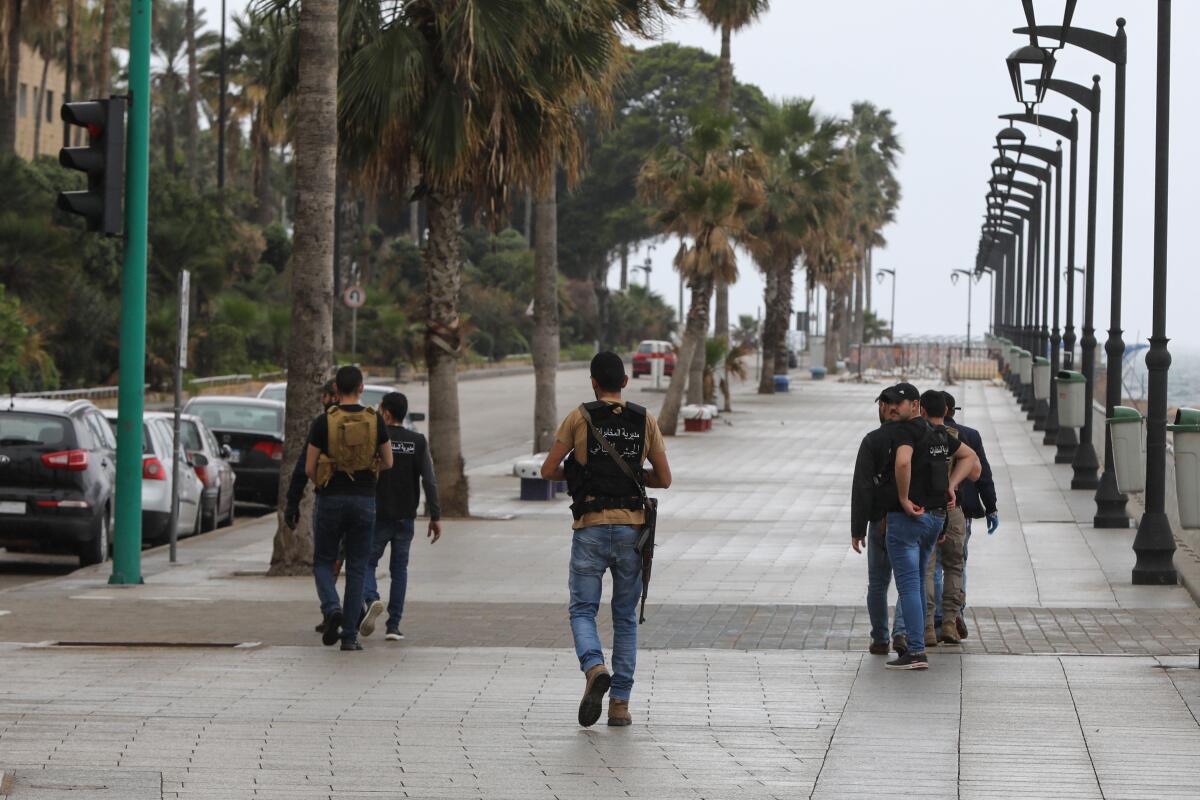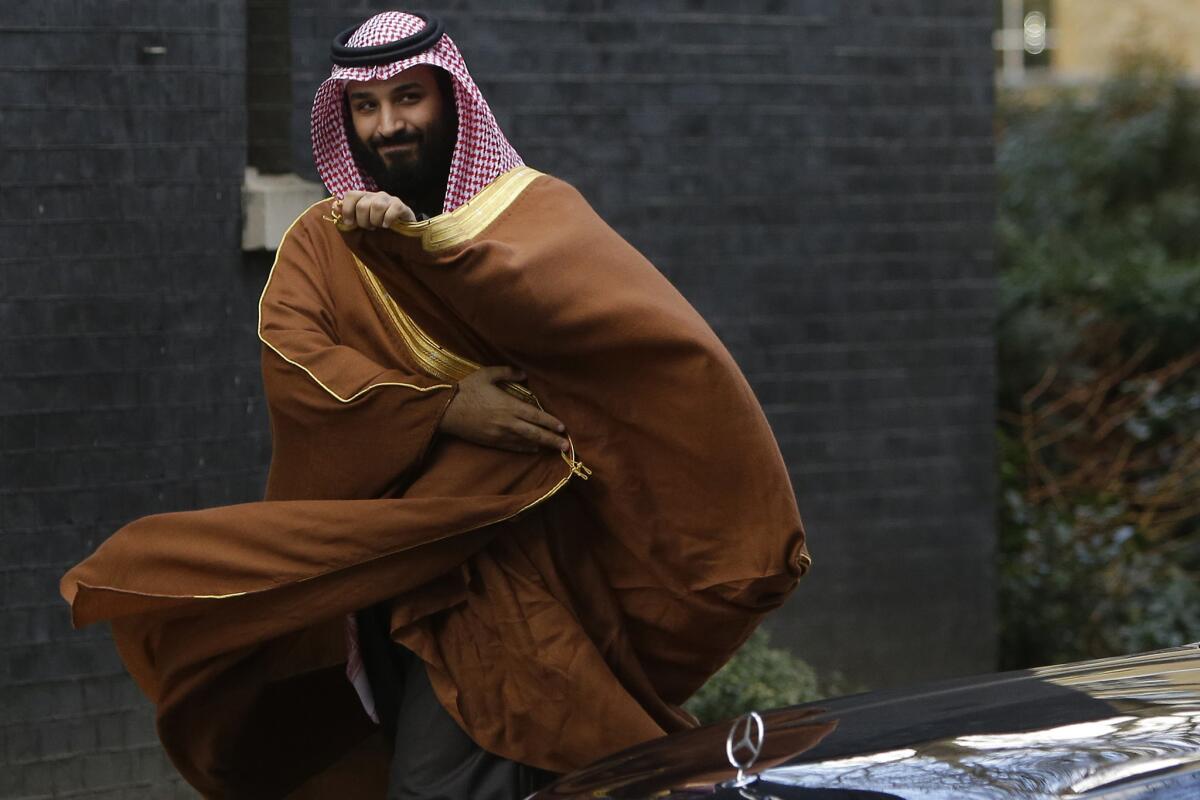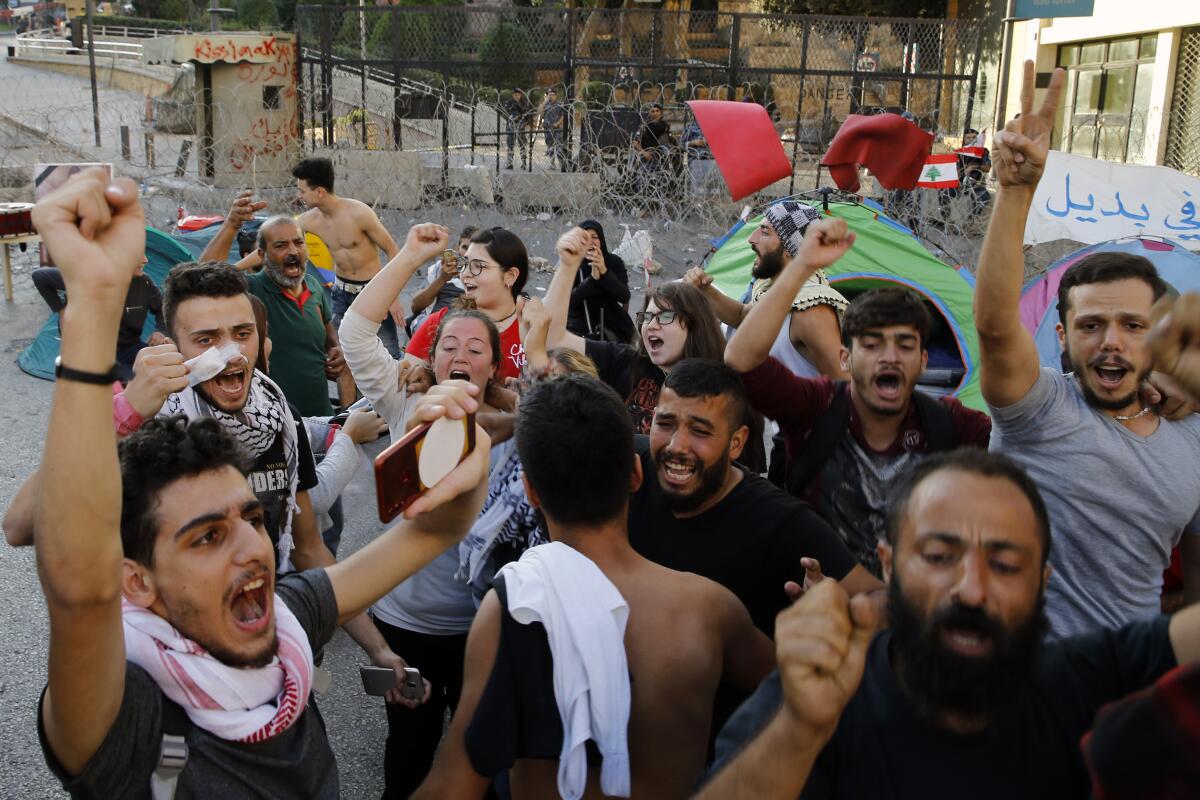Lonely joggers and fretful bakers: The coronavirus is hitting the Middle East hard

- Share via
BEIRUT — The coronavirus has turned bustling Beirut into a timid capital: You can see it in the lone jogger on the city’s normally crowded seaside corniche; in the absence of gray-haired habitués from their haunts. You could also spot it in Abu Shadi, the outgoing neighborhood baker secretly handing a box of cheese-and-spinach pies to a customer as if it were something illicit.
“We’re supposed to be closed, but — quickly! — take this and go,” he said, looking down the street as a patrol car approached. The buyer hid the box under his arm, scurrying away. Abu Shadi looked sheepish as he lowered the bakery’s shutters moments before the police drove by.
Beirut residents often boast that even at the height of the 15-year civil war the city never shut down. They take pride in the Lebanese capital’s party-while-the-bombs-fall attitude. Yet there is decidedly less partying now, with the coronavirus bringing a calculus that conflict did not. For Lebanon and other Middle Eastern countries, the race to slow the spread of the disease — to “flatten the curve” — has turned desperate, as governments fear the pandemic will overwhelm health systems battered by instability and deal death blows to economies already on the brink.
In Lebanon, where the virus has infected 120 people and killed three, that fear led the government to declare a “medical state of emergency” that would seal the Mediterranean nation’s borders as of Wednesday and close almost all businesses for two weeks. The restrictions built on earlier closures of schools as well as cafes, restaurants and parks. Even shisha (hookah) bars were shuttered. Officials stopped short of imposing a curfew, but citizens were admonished to stay at home unless “absolutely necessary.”
Those actions, said Lebanese Prime Minister Hassan Diab, have “positioned us several steps ahead of the virus. “

But the virus has quickly altered the daily noise of life — the kiss-and-hug greetings and large family gatherings like weddings or funerals — typical in the region. It is a war with an unseen enemy, one that upended where prayers are prayed and even traditional arrangements that have generations of families sharing the same house.
The collateral damage will cut deeper into Lebanon’s top sectors, including tourism and hospitality, which were already enfeebled by a five-month economic downturn. That crisis had wiped out almost two-thirds of the local currency’s value against the dollar even before the government defaulted on its $90-billion debt. It had decimated hundreds of businesses, sent unemployment spiraling to 40% and threatened the availability of essential goods including medicines.
“There is no doubt that these measures will affect our economy,” said Diab. “However, the people’s lives and safety are far more precious, and remain our priority above all else.”
That was the calculation across much of the region, where the total numbers of confirmed cases had exceeded 15,000 this week.
Saudi Arabia, Iraq and Algeria all announced flight suspensions, along with Qatar, which at 439 has the second highest number of cases in the Middle East after Iran. So did Jordan, but it also declared what amounted to martial law, stationing police and army units at entrances and exits of cities and preventing congregations of more than 10 people. The United Arab Emirates prohibited non-resident foreigners from entering the country, while Egypt said it too would stop travel after the number of infected patients jumped to at least 166, contradicting officials’ insistence that the virus was under control.

Saudi Arabia is undergoing a wide-scale social and economic revamping led by its crown prince, Mohammed bin Salman, even as it wages an oil price war against Russia. The coronavirus outbreak forced the government there to stop Umrah, the so-called “little pilgrimage,” which brought in roughly 7.5 million visitors to the country last year; it may also have to cancel the hajj season, a loss of more than 2.5 million visitors, based on 2019 figures.
Egypt too is set to lose the $12.5 billion it gets from tourism, which comprises almost 5% of GDP. But that wasn’t the only strike, said Timothy Kaldas, a non-resident fellow at the Tahrir Institute. “Egypt’s sources of dollars are all likely to take hits; tourism, remittances, Suez Canal revenue and natural gas… even its ability to sell its debt could be affected.”
Still, Saudi Arabia, Egypt and the UAE were luckier than many of their neighbors. For dollar-starved Lebanon, which has sought aid for months to stave off financial collapse, there would be no respite and little hope of economic stimulus packages. The shutdown is estimated to be costing Lebanon $2.5 billion every month.

Faced with the prospect of home quarantine, Lebanese now must contend with dismal infrastructure that delivers intermittent electricity (in some places, power cuts can last for half the day) and forces them to rely on roving tankers to fill up water. Then there is the country’s almost comically bad internet, which ranks 162 out of 176 in the January 2020 Speedtest Global Index. Long a millstone on the Lebanese economy, shoddy telecommunications now complicate any notion of working remotely or video conferencing.
The Lebanese Cabinet had announced last week it would double the speed and capacity for internet users subscribed with Ogero, the state-owned internet provider. The additions would be free until the end of April as a way to encourage people to stay home, but it was unclear if they had come into effect.
“It’s slowed down a lot, a lot, a lot,” said Roy, the operator of a private internet company in one of Beirut’s eastern neighborhoods who gave only his first name for reasons of privacy.
“They still haven’t upped the bandwidth for us. It’s just so slow now.”
Yet even Lebanon is better off than Syria, a country almost primed for a widespread coronavirus outbreak. Sanctions there have strangled the economy and gutted most public services. Its healthcare has become a target in the nine-year war between Syrian President Bashar Assad and his rebel adversaries. Assad has tight military and economic links with Iran, the regional epicenter of the virus, as well as China. Syria’s many divisions have made it impossible to coordinate a cohesive response to the virus.
Meanwhile, the conflict has displaced an estimated 6.2 million people — including 2.5 million children. The latest government offensive on the northwestern province of Idlib, aid groups say, pushed almost a million people from their homes, with families crowding into whatever living arrangement they can manage.
“There has never been such a lack of shelter. You have people living outdoors, in tents or unfinished buildings, with no access to clean water and sanitation,” said Misty Buswell, the Middle East policy director for the International Rescue Committee aid group, adding that “conditions were ripe” for an outbreak in Syria that has a “much more severe impact than other places we’ve seen.”
“That’s a big thing: prevention is all about hand washing and distancing, and there isn’t enough,” she said.
The World Health Organization said it would begin testing for the virus later this week in Idlib, which is under the sway of Syrian rebel factions, and had already been working with the government on testing in territories it controls.
Yet Syria illustrates another problem hampering Middle East states — lack of credibility. Despite being surrounded by countries with coronavirus outbreaks, Syrian government officials insist there have been no confirmed cases of the virus. It’s a claim contradicted by the Syrian Observatory for Human Rights, which last week reported that the virus had already spread to four major provinces in the country but that doctors were “under strict orders to stay quiet.”
“A challenge that regional governments face is that their history of refusing to be transparent and at times being outright dishonest with their people leads many to doubt the information they share, even when they’re being honest,” Kaldas said. “In a situation like this, a lack of credibility on the part of the government can be deadly.”
It also means that people, including Abu Shadi, the Lebanese baker, may be less inclined to follow government edicts.
“It’s a Sunday and I have loads of business,” he said after a police car drove by.
“I’m not going to stop working.”
The bakery stayed closed Monday.
More to Read
Sign up for Essential California
The most important California stories and recommendations in your inbox every morning.
You may occasionally receive promotional content from the Los Angeles Times.











